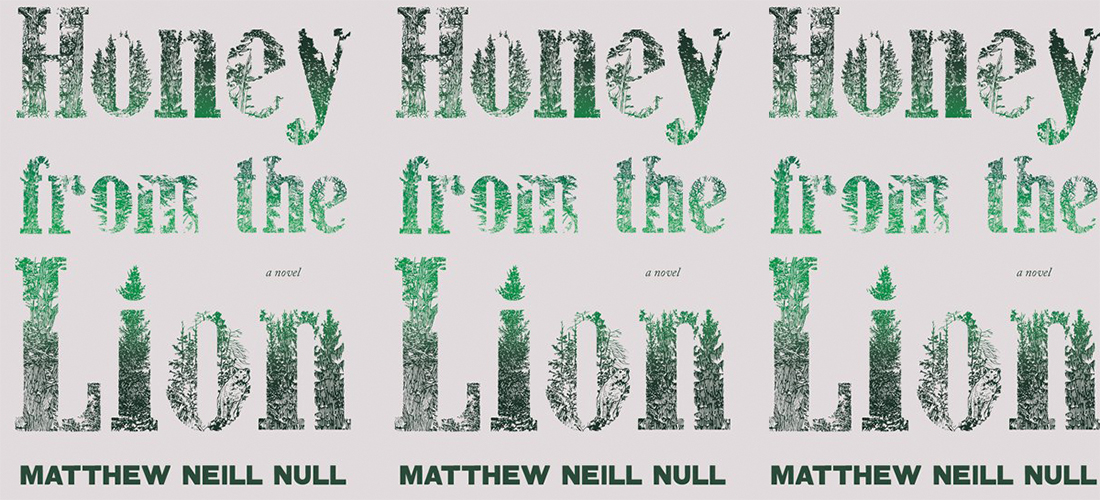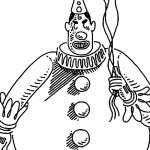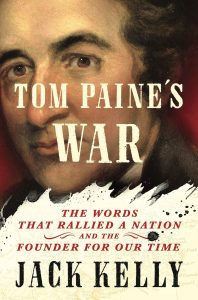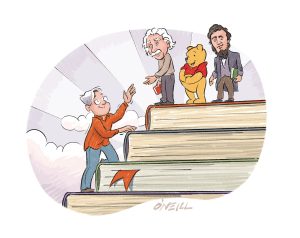
A fascinating first novel, a talk of ecological disaster
By Gwenyfar Rohler
Upstairs in the UNC Wilmington Creative Writing Department is the publishing laboratory, where the literary magazine Ecotone matured, and a small press, Lookout Books, refines their books into existence like an oyster begetting a pearl. Until recently, Lookout’s carefully curated and award-winning catalog included two collections of short fiction, a memoir and even a book of poetry, but no novel. But now, Lookout and writer Matthew Neill Null have both dipped their proverbial toes in the water of novel-writing by debuting their first novel, Honey From The Lion, last year.
In the book, set in and around a logging camp in West Virginia at the turn of the 20th century, Null brings us characters that many people would cross the street to avoid. He slowly pulls back the curtains and, with a flickering gaslight, breathes life into these unwashed, violent and desperate people who then become the source of great empathy.
Honey From The Lion is not a hymn to strong men who control other people’s destinies, though the first chapter and the title (an allusion to Sampson from the Bible) might hint at that. For Null, the real story is the struggle of the hundreds of working men to realize their own destinies within their private lives and a system with the singular purpose of exploitation of resources — natural and human. He takes a microscope to look as closely as possible at individuals who, in most circumstances, would never be anything more than statistics: ledger columns, payroll, accident reports. These moments, teasing out the backstories of each character, no matter how minor, are reminiscent of David Foster Wallace.
Echoes of Larry McMurtry’s Lonesome Dove reverberate as well. The introduction and development of the uber macho world are built around a strict code and the appearance of outsiders unprepared to understand the code. But where McMurtry’s men have developed their own code and live outside the dictates of a world they reject, Null’s are trapped inside the code as the least powerful players in their ecosystem.
The care and adoration lavished on a Lookout book is obvious. The physical product is a beauty to behold in an age where book design and production are sidelined for bargain prices and expedient content delivery. Not at Lookout. French flaps, beautiful graphic design and tailored page layouts are the hallmarks of a book that someone cares about. (On the rare occasions that you see a book this carefully created from a big publisher, you know it was the pet project of someone in the office who went the extra mile.) At Lookout, each book radiates that level of care. Perhaps that is the best argument for smaller presses: Because each book takes so much time and effort, they put out few in a year (Lookout produces only one or two annually), and each book is almost a sacred experience. Any author would swoon to have his or her work treated with such reverence, especially for one’s debut novel.
Curious about the selection process for Lookout’s first novel, I reached out to Emily Smith, publisher and co-founder of Lookout. Smith writes, “Null evokes the virgin forest as a fully realized character we grieve deeply by the end of the novel. He implores us to care about the ecological tragedy in West Virginia through story . . . it presented a rare opportunity for our publishing entities to better align our missions and to showcase a book in which place and the natural world feature prominently.”
Ecotone, the sister imprint, place-centric magazine, published Null’s story “The Island in the Gorge of the Great River” in the spring 2014 issue. Null, the then-emerging writer, had not published a book, which appealed to Lookout, whose mission states “seeks out emerging and historically underrepresented voices, as well as overlooked gems by established writers.” In manuscript form, Smith was attracted to this novel’s “nuanced and lyrical descriptions of the natural world, its expansive and cinematic pace.”
Lookout has enjoyed success with previous publications, like their first one, Edith Pearlman’s story collection Binocular Vision, a finalist for the National Book Award in 2011. The following year, Lookout published Steve Almond’s story collection God Bless America: Stories, which won the Paterson Fiction Prize. They know how to pick a winner and how to present one.
I can only imagine the stunned grin that must have spread across Null’s face the moment he received his first novel in Lookout-form. But, from reading Honey From The Lion, I am certain he would recreate the moment in stunning, captivating, undulating prose, drawing the experience out for paragraphs if not pages, intensifying the moment to something epic in contrast to the momentary sensation of pages in hands.
A part of the Creative Writing program at UNC Wilmington, Lookout ensures that the art of bookmaking continues to live hand-in-hand with the art of writing. It may be one of the most valuable lessons to impart on to the next generation of writers. Because, as in Lookout’s new novel, each page holds moments experienced in-depth that draw and enlighten the darkened corners of each character’s soul. Value the written word (and the well-designed book) as something sacred, for it will outlive all of us. PS
Gwenyfar Rohler spends her days managing her family’s bookstore on Front Street.





